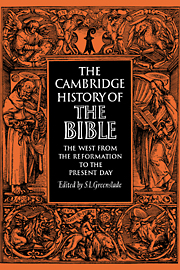Book contents
- Frontmatter
- Chapter I The Bible in the Reformation
- Chapter II Biblical Scholarship: Editions and Commentaries
- Chapter III Continental Versions to c. 1600
- Chapter IV English Versions of the Bible, 1525–1611
- Chapter V The Religion of Protestants
- Chapter VI The Bible in the Roman Catholic Church from Trent to the Present Day
- Chapter VII The Criticism and Theological Use of the Bible, 1700–1950
- Chapter VIII The Rise of Modern Biblical Scholarship and Recent Discussion of the Authority of the Bible
- Chapter IX Continental Versions from c. 1600 to the Present Day
- Chapter X English Versions since 1611
- Chapter XI The Bible and the Missionary
- Chapter XII The Printed Bible
- Chapter XIII Epilogue
- Appendices
- Bibliography
- Notes on the Plates
- Index
- Plate Section
- References
Chapter IV - English Versions of the Bible, 1525–1611
Published online by Cambridge University Press: 28 March 2008
- Frontmatter
- Chapter I The Bible in the Reformation
- Chapter II Biblical Scholarship: Editions and Commentaries
- Chapter III Continental Versions to c. 1600
- Chapter IV English Versions of the Bible, 1525–1611
- Chapter V The Religion of Protestants
- Chapter VI The Bible in the Roman Catholic Church from Trent to the Present Day
- Chapter VII The Criticism and Theological Use of the Bible, 1700–1950
- Chapter VIII The Rise of Modern Biblical Scholarship and Recent Discussion of the Authority of the Bible
- Chapter IX Continental Versions from c. 1600 to the Present Day
- Chapter X English Versions since 1611
- Chapter XI The Bible and the Missionary
- Chapter XII The Printed Bible
- Chapter XIII Epilogue
- Appendices
- Bibliography
- Notes on the Plates
- Index
- Plate Section
- References
Summary
Tyndale
The survival of some two hundred manuscripts of the Wycliffite versions, most of them written after the synods of Oxford and London, A.D. 1407–9, is sufficient evidence of a demand for the Scriptures in English which legislation could not stifle. With the invention of printing (even if that did not immediately bring cheap and plentiful copies of the Bible) the galling knowledge that vernacular versions were circulating, sometimes with the consent of the Church, in most European countries must have stiffened determination to get an English translation into print. Further stimulus came from the teaching of Colet at home and from the Reformation in Germany and Switzerland. Simultaneously the quickening of scholarship manifest in the Complutensian Polyglot and Erasmus's Greek Testament meant that no mere rendering of the Vulgate would suffice, although one made from the original languages must provoke greater opposition from ecclesiastical authority. England was fortunate to have in William Tyndale the man who could do what was wanted, a man of sufficient scholarship to work from Hebrew and Greek, with genius to fashion a fitting English idiom and faith and courage to persist whatever it cost him.
Publication
With an Oxford education behind him (B.A. 1512, M.A. 1515), followed by a period of study at Cambridge, Tyndale went as tutor to the family of Sir John Walsh of Little Sodbury, Gloucestershire, where he not only found himself countering the arguments of Walsh's guests (abbots, deans, archdeacons and divers doctors, says Foxe) by open and manifest Scripture, but also translated Erasmus's Enchiridion Militis Christiani.
- Type
- Chapter
- Information
- The Cambridge History of the Bible , pp. 141 - 174Publisher: Cambridge University PressPrint publication year: 1963
References
- 12
- Cited by

